Ask a question from expert
(Solved) Financial Accounting Principles PDF
27 Pages4954 Words48 Views
Added on 2021-02-21
(Solved) Financial Accounting Principles PDF
Added on 2021-02-21
BookmarkShareRelated Documents
Financial AccountingPrinciples
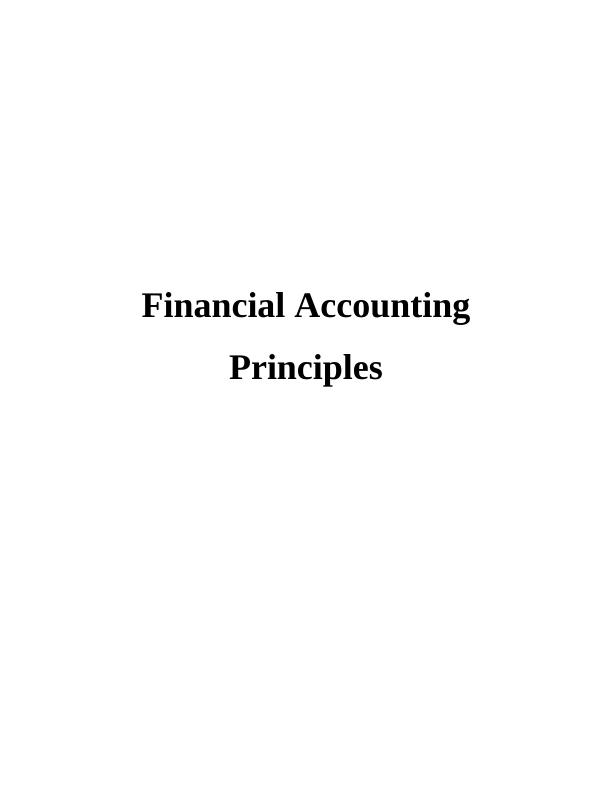
Table of ContentsINTRODUCTION...........................................................................................................................4Part A...............................................................................................................................................4Define financial accounting and its purposes..............................................................................4Two internal and four external stakeholders of a large organisation and the reason behind theirinterest in the financial information of a company......................................................................6Part B...............................................................................................................................................7Client 1.............................................................................................................................................7a.) Recording journal entries........................................................................................................7b.) Preparation of Trial balance.................................................................................................15Client 2...........................................................................................................................................16a.) Profits and loss statement.....................................................................................................16b.) Financial position statement.................................................................................................16c.) Accounting concepts.............................................................................................................18d.) Purpose of depreciation........................................................................................................18e.) Distinguish between limited companies and Sole traders....................................................19Client 3...........................................................................................................................................20a.) Purpose of BRS....................................................................................................................20b.) List of factors which vary the records..................................................................................20c.) Assessment on term “Imprest”.............................................................................................21d.) Cash book of Burcu Ltd.......................................................................................................21Client 4...........................................................................................................................................23a.) Preparation of control account..............................................................................................23b.) Explanation on term Control account...................................................................................24Client 5...........................................................................................................................................24a.) Assessment on term “Suspense account”.............................................................................24b.) Trial balance.........................................................................................................................25c.) Rectification of errors in trial balance..................................................................................25CONCLUSION..............................................................................................................................26REFERENCES................................................................................................................................1
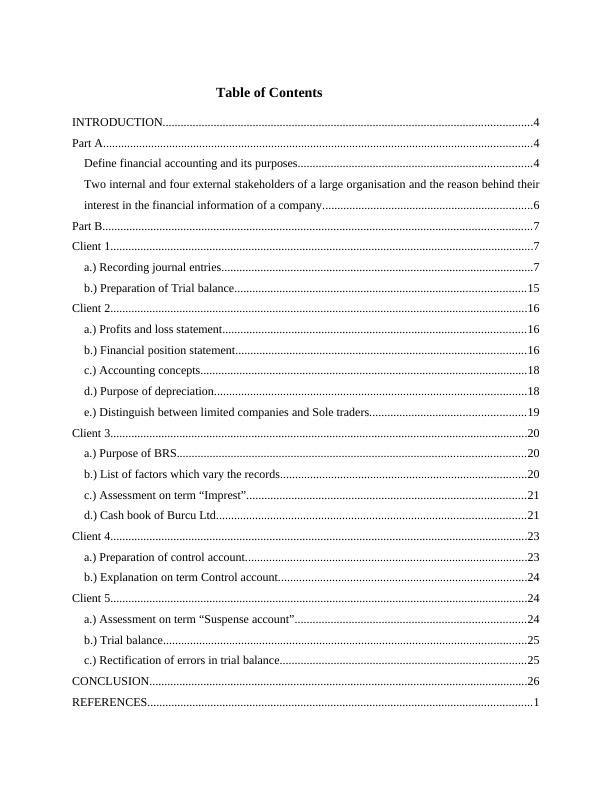

INTRODUCTION Financial accounting is a branch of commerce basically concerned with recording,summarizing and reporting the transactions that are resulted from the business operations over aperiod of time. These transactions are used in the preparation of financial statements that includeincome statement, balance sheet and cash flow analysis which are useful for both company aswell as outsiders. Double entry concept of book keeping states that every transaction or financialentry has equal and opposite effects in two different accounts. All the transactions are recordedin the terms of debit and credit in order to balance the books of accounts. As a junior accountantof Haines Watts, a small accountancy firm in the United Kingdom that mainly deals with taxmatters and general business services, it is important to identify the rules, principles andconventions related to accountancy. The current report will emphasize on the purpose offinancial accounting, its effect on stakeholders, preparation of financial statements for differenttypes of businesses, bank reconciliation and the process to reconcile control accounts. Part ADefine financial accounting and its purposes.Financial accounting is basically an organized process through which an organisation'srevenue and expenses are collected, measured, recorded and reported. It is also required byshareholders, investors and creditors of the company in order to analyse their growth prospectsand overall profitability of the company.The purpose and objectives of financial accounting are as follows:Recording: The main purpose of accounting is to keep a record of all the financialtransactions in order to evaluate the overall performance of the company. Systematicrecording helps a company in their growth by evaluating their short comings and workingon them.Planning: Financial accounting plays an important role in systematic planning regardingthe utilisation of resources. It helps in the preparation of budgets which further leads toproper coordination within different resources of the company. Hence, it is anotherimportant purpose of financial accounting.In the view point of Robinson and et.al., (2015) accounting also helps in comparison ofcurrent financial performance with the previous year's and then develop budget or trends
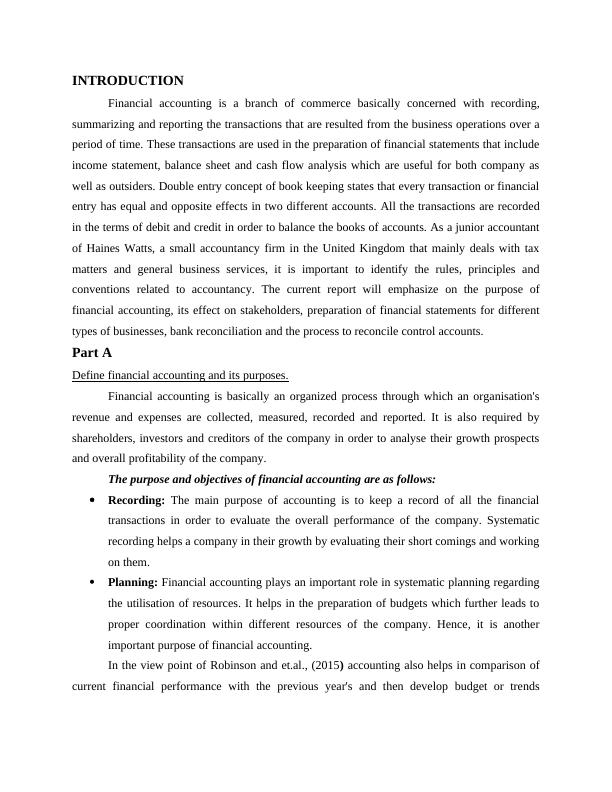
accordingly. Also, the budget acts as a roadmap for the achievement of organisational goals andobjectives efficiently and effectively. Decision: Another important purpose of financial accounting is that it helps the businessmanagers in decision-making regarding various aspects of the company. The decisionscan be related to financing, profit or sales maximization or some other businessoperations.According to Legrand, (2017) financial accounting not only helps the company but alsothe investors, creditors and shareholders in taking various decisions. This is why financialaccounting is called the backbone of an organisation.Position: Accounting is concerned with the preparation of financial statements that helpin evaluating the overall performance of the company. It not only helps in inter-firmcomparison but also in intra-firm comparison which is beneficial for the business as ithelps them in identifying their key points and take necessary actions accordingly. Inaccordance with Fusch, Hall and Fusch, (2018)the financial position of an organisationalso provides a clear view to its members regarding their actual performance and futuregrowth prospects.Financing: The major purpose of financial accounting and statements is to secure fundsfor the company, Collison and et.al., (2016) has stated that that the most practical use offinancial statements is to secure finance from commercial banks, financial institutionsand creditors. Also, in order to secure funds from the shareholders and other investors itis imperative for an organisation to showcase their history of financial performance. Legal: Financial accounting also serves its legal purpose by acting as an importantdocument for every business and it is the fundamental duty of a company to follow itotherwise it may have to face legal consequences. Also Brumbaugh, (2016) has statedthat systematic reporting of financial statements minimizes government intervention andensures smooth working of an organisation in the long run. Liquidity: Improper management of cash is one of the most important reason for failureof a business. Therefore, systematic recording of financial transactions helps anorganisation to keep a regular check on their cash inflows and outflows and manage themadequately. Difference between management accounting and financial accounting.
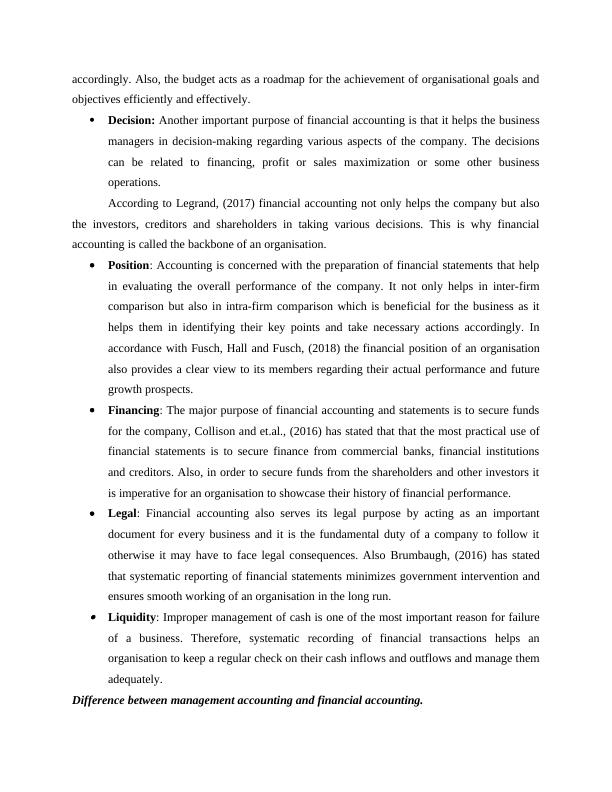
Financial accounting is a branch of commerce basically concerned with recording,summarizing and reporting the transactions that are resulted from the business operations over aperiod of time. It is very important in analysing the financial position of the organization forstrategic decision making. It complies with various accounting standards such as IAS, IFRS andGAAP for smooth functioning and reliable information. Financial statements are to be preparedat the end of every financial year. Financial statements are useful for both external as well asinternal stakeholders. On the contrary, management accounting is an effective process as it helpsin planning, organizing, monitoring and controlling the functioning of the company. It is notnecessary to prepare management reports every year and it does not have to comply with variousaccounting standards. Management accounting reports are useful for internal stakeholders of thecompany in order to take strategic decision. Two internal and four external stakeholders of a large organisation and the reason behind theirinterest in the financial information of a company.A stakeholder is an individual or a party that has an interest in the operations of theorganisation and have the power to either affect or get affected by the working of the business.Stakeholders can be internal as well as external. Internal stakeholders are usually directlyin touch with the company such as employees, investors and board of directors whereas externalstakeholders are not directly related with the company but can be affected by their actions orchanges in operations like suppliers, competitors and customers. Every stakeholder has a separate reason behind their interest in the financial informationof the company.Internal stakeholdersEmployees: Financial statement is the only source of information for the employees ofthe company in order to identify the profitability and current position of their business.Like, the management of the company employees are also interested in financialinformation in order to get assurance that the organisation is financially stable to paythem their salaries and other incentives. Moreover, employees and the workforce of anyorganisation are always keen to know the future growth prospects of the company andtheir expansion possibilities (Andriof and Waddock, 2017).Board of directors: Board of directors of the company includes its owners and otherpermanent members that take decisions, make policies and control the overall working of
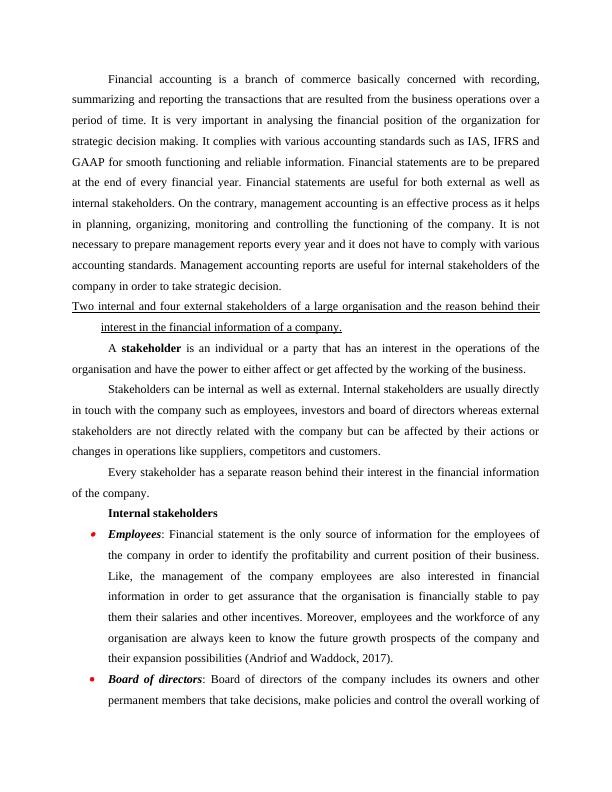
End of preview
Want to access all the pages? Upload your documents or become a member.
Related Documents
Report on Accounting Conventions and Principleslg...
|34
|3968
|114
Preparing financial position of Raintree Ltd16lg...
|29
|4619
|116
FINANCIAL ACCOUNTING INTRODUCTION 1lg...
|31
|2925
|245
Financial statements of an organisationlg...
|30
|4847
|464
Financial Accounting Principles - Doclg...
|27
|4169
|486
Purpose of Financial Accounting - PDFlg...
|31
|4996
|80